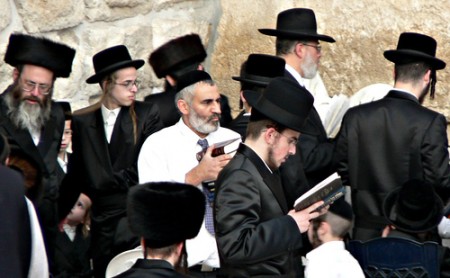
Recently, Israel has experienced several inner conflicts. But this time, Palestinians have nothing to do with them. It is a series of conflicts and tensions between the two faces of the Israeli population: Orthodox Jews and secular Jews. As a report by the Institute for National Security Studies of Tel Aviv mentions, “a different but no less serious challenge to Israel is the deep ideological divisions among the Jews themselves.”
Examples of this division can be observed almost daily in the local media. From the settlement policy to the future of Palestine, the ideological difference is clear. Part of the Orthodox minority, most of them are settlers, is determined to occupy, if not conquer, the land they believe God gave them. As a short example of their determination, the government needed 40,000 troops and policemen and months of preparation to remove fewer than 8,000 settlers from the Gaza Strip over a period of a few months.
Until recently, this minority had little to say in terms of national policy. But the last election that saw Israeli Prime Minister Binyamin Netanyahu gathering a right-wing coalition changed the presence of the orthodox group on the political stage. The coalition government now includes several members of the Shas party and even one member of The Jewish Home. Theses religious parties are strong advocates of the presence of the Halakha, the Jewish law, in Israeli law. This once-stable coalition is now starting to fall apart:
During the current holiday season, a religious organization, Lobby for Jewish Values, is lobbying to prohibit Christmas trees in restaurants and public places. This could be considered as a trivial and rather innocent form of political activism, but it can also be considered the beginning of a much stronger influence of Orthodox Judaism on the public stage.
Israeli Housing Minister Ariel Atias called for segregation in Israeli society, not only between Muslims and Jews, but also between secular and Orthodox Jews: “I, as an ultra-Orthodox Jew, don’t think that religious Jews should have to live in the same neighborhood as secular couples.”
Recently, the justice minister, although an independent, said that “step by step, the Torah law will be restored to Israeli citizens and Halakah will become the binding law of Israel.” If implemented, this would mean that the rules of everyday life would be dictated from a religious point of view. This decision would challenge the secular majority, the non-Jewish minority of Israeli citizens and the common law currently ruling the country.
What is astonishing in this quest to establish religious law in Israel is that it goes against the view of a part of the orthodox community, the Orthodox Jews United Against Zionism, which claims the creation of Israel, as it was done back in 1948, was a mistake. According to the group, the ‘Promised Land’ should be given by God, not by humans. They are thus fighting for the removal of the Israeli state and for the establishment of a Palestinian state.
There is only one way to make sure this spaghetti bowl of religion and politics called Israel remains stable: secularism. This may sound naive within the context of the Israel-Palestinian conflict, but maintaining a clear separation of responsibilities within the Israeli territory is the only solution to the pluralism of the society. To avoid clashes and strong political confrontations between orthodox Jews, secular Jews and Arab and Muslim Israelis, the law needs to remain neutral. This doesn’t mean status quo, it means implementing this concept “hic et nunc,” by allowing, for example, civil marriage for those who want it.
Avrahm Burg, former president of the Knesset, said in his book that “to define the State of Israel as a Jewish state is the key to its end. A Jewish state is explosive. It’s dynamite. […]The alternative […] is to develop a State of Jews.”
Israel will definitely benefit from this internal stability and will provide a good example to its Palestinian neighbor that keeping religion out of politics is the best way to manage multicultural societies.

